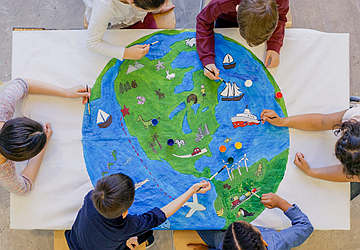How to Learn a New Language: Top 10 Steps to Cultural Fluency
Acquiring a new language offers an unparalleled opportunity for personal growth and fulfillment. The process not only grants us access to diverse cultures but also expands our global perspective and sharpens our cognitive prowess. Irrespective of the purpose behind learning a language, be it for wanderlust, professional aspirations, or self-improvement, there exist effective strategies that can optimize our language acquisition expedition.
Within the realm of this discourse, we shall delve into the paramount tenets facilitating the attainment of cultural fluency in a novel linguistic domain. By adhering to these principles, you will be well on your way to mastering the art of eloquence, embracing a fresh linguistic and cultural ethos.
Best 10 Steps to Learn a Language and Cultural Fluency
Below ten steps assist you in mastering a new language and adapting cultural fluency.
1. Set Clear Goals
To begin your expedition into the realm of language acquisition, it is of utmost importance to lay the groundwork by defining your aspirations. Reflect upon the driving force behind your desire to master this linguistic tapestry. Craft precise and distinct ambitions, encompassing the ability to engage in seamless dialogue, unravel the nuances of literature, or decipher the intricate narratives woven within the cinematic artistry of the language.
By sculpting well-defined objectives, you shall not only nurture your motivation but also ascertain tangible benchmarks to gauge your advancement on this remarkable voyage.
2. Choose the Right Language Learning Method
With numerous language learning methods available, it's crucial to find the one that suits your learning style and preferences. Some popular methods include attending language classes, hiring a tutor, using language learning apps, or immersing yourself in the culture by traveling to a country where the language is spoken. Experiment with different approaches to find what works best for you.
3. Build a Strong Foundation with Vocabulary and Grammar
Language acquisition relies on the fundamental pillars of vocabulary and grammar. Initiate your linguistic journey by acquainting yourself with indispensable terms and expressions, subsequently broadening your lexical repertoire as you advance. Familiarize yourself with the tenets of grammar and apply them purposefully within contextual frameworks.
Numerous educational materials catering to language acquisition, spanning from traditional textbooks to interactive online courses and cutting-edge linguistic applications, present meticulously organized modules to facilitate the assimilation of these foundational linguistic components.

4. Foster Effective Listening and Speaking Skills
Mastering a language requires honing your aptitude for listening and verbal expression. Immerse yourself in the linguistic world by delving into podcasts, harmonies of music, captivating movies, and enthralling radio programs, all in the language you desire to conquer.
Emulate the native speakers' articulation, melody, and cadence, allowing these elements to refine your own spoken prowess. Seek interactions with those fluent in the language.
5. Enhance Reading Comprehension
Reading in the target language exposes you to new vocabulary, sentence structures, and cultural nuances. Start with simple texts and gradually progress to more complex materials. Read books, newspapers, magazines, or online articles in the language you're learning. Make use of dictionaries and language reference tools to aid your understanding and expand your reading comprehension skills.
6. Cultivate Writing Skills
The art of writing holds great significance in the process of acquiring a new language. Cultivate the habit of consistently engaging in written expression within your desired linguistic realm. This will fortify your grasp of grammatical rules, vocabulary acquisition, and the structuring of sentences.
Nurture your language journey by maintaining a personal journal, crafting thoughtful essays, or immersing yourself in digital communities dedicated to linguistic exploration, where valuable feedback from native speakers can be obtained. Embrace corrections as an opportunity to improve and refine your writing skills.

7. Embrace Cultural Immersion
Mastering a foreign language transcends mere memorization of words and rules. It necessitates complete immersion in the captivating tapestry of its associated culture. Delve into the rich world of literature, delve into the enchanting realms of cinematic creations, resonate with the symphonies of melodic compositions, and marvel at the awe-inspiring strokes of artistic brilliance that emanate from the very heart of the target culture.
Embrace cultural festivities, partake in vibrant language exchange collectives, and forge meaningful connections with indigenous speakers.
8. Utilize Language Learning Technology
Take advantage of language learning technology to enhance your language acquisition process. There are various apps, software, and online platforms specifically designed to help learners improve their language skills.
These tools often offer interactive exercises, pronunciation guides, vocabulary drills, and progress-tracking features. Incorporate technology into your language learning routine to make the process more engaging and efficient.
9. Stay Consistent and Practice Regularly
Achieving success in language learning heavily relies on maintaining consistency and diligently practicing linguistic skills. Devote specific intervals on a daily or weekly basis solely for studying and honing your language abilities. Craft a well-structured timetable and strictly adhere to it.
Discover innovative methods to integrate the language seamlessly into your everyday existence, such as affixing labels to household objects, configuring your mobile device to operate in the target language, or indulging in language-focused podcasts while commuting.
10. Stay Motivated and Enjoy the Journey
Language learning can be challenging at times, but it's important to stay motivated and enjoy the process. Celebrate your achievements, no matter how small, and acknowledge the progress you're making.
Surround yourself with supportive communities of fellow language learners who can share resources, tips, and encouragement. Remember that learning a new language is a lifelong journey, and embracing the process with a positive mindset will lead to greater success.
Conclusion
To summarize, the acquisition of a foreign language brings about a profound metamorphosis that unveils unexplored avenues and enriches one's comprehension of the global landscape.
By formulating explicit aspirations, selecting an appropriate learning approach, establishing a sturdy groundwork, cultivating essential linguistic abilities, engrossing oneself in the associated culture, harnessing the potential of technological advancements, and maintaining unwavering dedication and enthusiasm, one can attain an unparalleled level of cultural proficiency in a novel language. Embrace the hurdles encountered, relish the triumphs achieved, and delight in the expedition that awaits as you embark upon this exhilarating venture of language assimilation.










